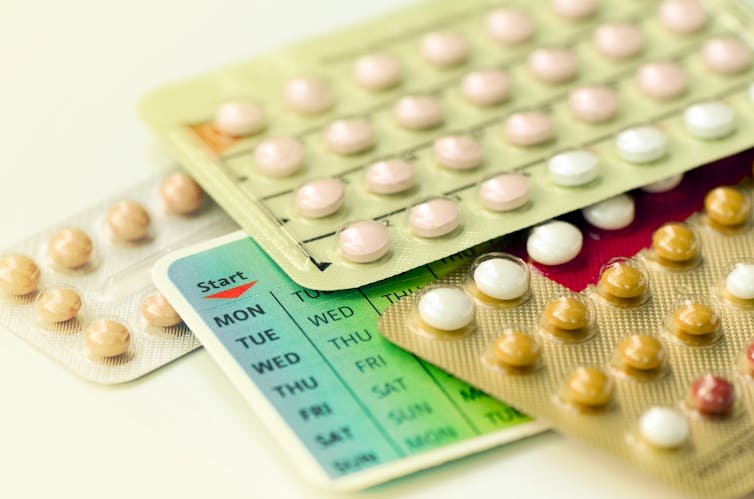Informed consent: women need to know about the link between the pill and depression.Some women are very sensitive to small shifts in oestrogen and progesterone; others aren’t.
Jayashri Kulkarni, Monash University and Caroline Gurvich, Monash University
The introduction of the contraceptive pill in the 1960s was a major milestone for female empowerment. It allowed women to separate sex from procreation, and to increase their participation in work outside the home.
Now, more than 100 million women worldwide use the oral contraceptive pill to prevent pregnancy or control their menstruation.
But the pill and other hormone contraceptives are not without side effects. We usually focus on the physical health effects of the pill, yet the most common reason women stop or change the pill is mental health side effects.
Read more:
Chemical messengers: how hormones affect our mood
Depression is one of the most prevalent and debilitating mental disorders in Australia, and affects twice as many women as men. It is estimated that one in four women will experience depression in her lifetime.
One in four Australian women between the ages of 18 and 49 use the pill, at any one time. But few are aware of the link between the pill and depression.
Types of contraceptive pill
There are many oral contraceptives available in Australia, with different types and doses of the hormones oestrogen and progesterone.
The most commonly prescribed is a combination pill, which contains an oestrogen to prevent ovulation, and a progesterone to reduce the chance of a fertilised egg implanting into the wall of the uterus.
Most combined oral contraceptives have a similar dose and type of oestrogen, but the progesterone types and doses vary widely.

From shutterstock.com
There are also several progesterone-only contraceptives that do not contain oestrogen. These are known as the “mini-pill”, or injected contraceptive (“depot provera”), or the skin implanted “straw” (Implanon or Norplant).
Hormones and mental health
A recent review has shown that sex hormones have significant impact on brain areas related to emotional and cognitive functioning. Progesterones have been shown to induce depression, particularly in vulnerable women.
Synthetic progesterone (more than natural progesterone) has significant effects on the brain chemicals serotonin and monoamine oxidase, resulting in depression, irritability and anxiety.
There is a great deal of variation in the effects of hormone shifts on mood and behaviour. Some women are very sensitive to small shifts in oestrogen and progesterone; others aren’t.
What does the research say?
Our research has involved measuring the clinical impact of various types of oral contraceptive pill on mood and anxiety. Overall, we found woman taking the oral contraceptive pill were more likely to be depressed than non-pill users.
Women taking the pills with low amounts of oestrogen had more depression than those taking higher oestrogen dose pills.
Certain types of progesterone were more “depressive” than other progesterones, but the progesterone-only contraceptives were the most depressive of all the contraceptives.
Read more:
Biology is partly to blame for high rates of mental illness in women – the rest is social
A 2016 Danish study of more than one million women supports our clinical findings. The researchers found that, compared to non-users, women aged 15-34 who took the combined oral contraceptive pill were 1.23 times more likely to be diagnosed with depression and prescribed antidepressant medication.
Adolescents aged 15-19 who used combined oral contraceptives had an even higher rate of depression than older women. They were 1.8 times more likely to be diagnosed with depression than the non-pill using peers, and this increased to 2.2 times among adolescents using progesterone-only contraceptives.
The study concluded that depression is a significant potential side effect of hormonal contraceptive use, especially in adolescents.

From shutterstock.com
It’s not all bad news
Emerging research by our group and others suggests the combined contraceptive pill may improve “verbal memory” or memory for words and language. This is thought to be driven by oestrogen, which has been shown to positively influence memory-related brain regions.
Research also suggests that pills containing progesterones that are structurally more like testosterone improve visual-spatial skills (traditionally, a male-dominant skill) and pill types containing other progesterones may worsen visual-spatial skills.
Finding the right contraception
There are many types of hormone contraceptives and their use needs to be tailored carefully for the individual, especially among adolescents. Women and their doctors need to be aware that hormone contraceptives can contribute to mental health problems, and women should return to their GP if they experience mental health side effects.
The development of new hormone contraceptives that don’t impact adversely on brain chemistry is well overdue. Women must have the right to control their fertility without compromising their enjoyment of life.
![]()
Read more:
Chemical messengers: how hormones change through menopause
Jayashri Kulkarni, Professor of Psychiatry, Monash University and Caroline Gurvich, Senior Research Fellow and Clinical Neuropsychologist, Monash University
This article was originally published on The Conversation. Read the original article.




















-

-
-
mom112217 said
- 26 Jun 2018
-

-
-
mom81879 said
- 17 Jun 2018
-

-
-
becstalou said
- 16 May 2018
Post a comment10:37 am
1:12 pm
11:41 am
To post a review/comment please join us or login so we can allocate your points.